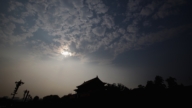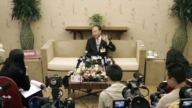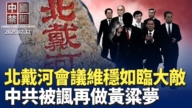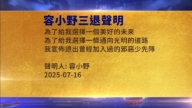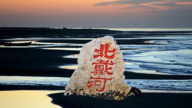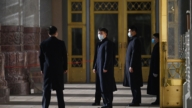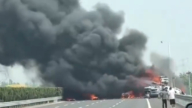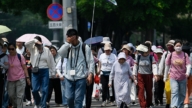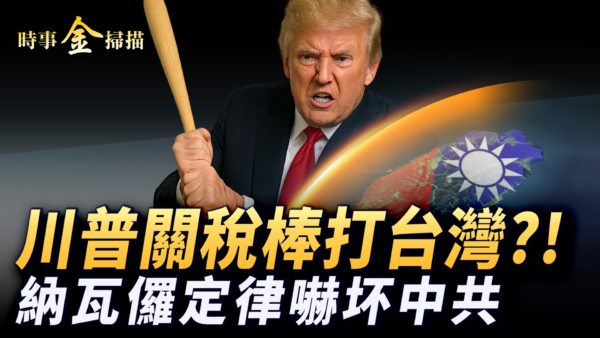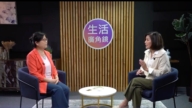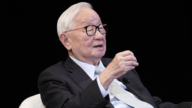【新唐人2012年6月27日讯】山东省公安厅日前召开机关领导干部会议,南京市副市长、市公安局局长徐珠宝被提名为山东省公安厅厅长人选。目前,中国各省、市、自治区中,已经有9位公安厅厅长是异地任职或空降任职。大陆媒体论断,这能防止重要部门的干部腐败。不过,学者认为,中共不从根本上改变,“政法委不除,晚清就是前车之鉴。”
6月21号,山东省公安厅机关领导干部会议在济南召开,宣布南京市副市长、市公安局党委书记、局长徐珠宝担任山东省省长助理、省政府党组成员、省公安厅党委书记、山东警察学院院长,并被提名为省公安厅厅长人选。
2012年以来,已经有浙江、四川、重庆、湖南、山东等五个省(直辖市)先后对公安厅厅长一职做出人事调整。除了四川省是由省内干部出任公安厅厅长以外,其余四省(直辖市)的公安厅新任厅长都来自外省。
在今年的换届中,公安厅长异地任职或空降任职也成为常态。对此,国家行政学院公共管理教研部教授竹立家认为,异地任职可以防止重要部门领导任职时间过长或长期在本地任职,容易产生的小圈子和利益关系。
时事评论员蓝述:“中共现在它整个公安系统和政法系统,在过去的十几年里,它是中共体制内最腐败的系统,它也没有好的办法去治理这个腐败,而且这个腐败盘根错节,上下左右都是牵着的。很可能简简单单的一个经济腐败,最后就变成了一个政治案件,变成了一场政治地震。”
蓝述表示,更换后还是这些腐败官员,所以只能是指标不治本。
大陆民间维权律师李向阳指出,中共地方的官僚官官相护,形成了互相保护的一个个小团体、小派别,仅仅换一个公安局长,根本解决不了问题。
大陆民间维权律师 李向阳:“中共的执政从一开始到现在没有合法性的,他们为了维持他们的统治、为了保护他们的既得利益,全部用的是流氓手段。假如依法办事,按照法律办事的话,中国老百姓的人权状况等等要比现在强得多。”
为民维权的李向阳现在被停了工资,断了生活来源。
李向阳:“中共向来从 经济上搞垮、政治上把你搞臭、肉体上把你消灭 ,他们惯用这流氓手段。”
李向阳认为,为了维持统治,中共虽然想尽了办法,但是“政令仍不出中南海”。中共已经病入膏肓无药可救。
而大陆民主人士恩广认为,虽然国内国际形势迫使中共做出一定的调整,但是,中共本质不变、不从根源上改变,就如同晚清政府想保住统治一样,最后民众还是群起攻之,中共在逐步走向那一步。
大陆民主人士恩广:“ 从根源上、或者是从他们的制度本身来说他们的出发点不是一个民主的,所以说他只能是靠很多的手段来执政,它暂时性的可能稳定一段时间。”
今年从2月开始,接连发生了王立军、薄熙来事件、陈光诚进入美领馆、李旺阳被自杀等事件,政法委在其中成为破坏“ 维稳 ”的主要机构。
香港的独立人权研究人士Joshua Rosenzweig说,周永康在过去10年中所做的事情是将中国妖魔化成一个“ 危险、不稳定的地方,必须加以控制,而资源需要投入其中来维持‘稳定’ ”。他进一步表示:周的部门“ 变得如此强大,以至于变成了可以对抗胡、温权力中心的第二个权力中心。”
《亚洲周刊》指出,中国的法律系统,被“政法系统”的专制权力所阉割,无法发挥追求正义与公正的制度功能,反而成为权力傲慢的工具,陷人民于不义。
采访/唐睿 编辑/宋风 后制/朱娣
Chinese Communist Party (CCP) Removes Provincial Police
Chiefs To Avoid Corruption
Xu Zhubao,former Nanjing vice mayor and local top policeman
was recently nominated as Shandong Provincial police chief.
China has seen a total of nine provincial-level police chiefs
brought in from out of the area and given assignments.
China’s media asserted the measure would avoid corruption
of important official positions.
Yet scholars say if the CCP remains essentially unchanged
without purging the Political & Legislative Affairs Committee,
the fall of the late Qing Dynasty is an instructive reminder.
A leadership meeting of Shandong Provincial Public Security
Department was held on June 21st in Jinan in Shandong.
The conference nominated Xu Zhubao as the chief of
Shandong Provincial Public Security Department.
Xu who was the previous director & Party chief of Nanjing
Municipal Public Security Bureau and Nanjing’s vice mayor,
took office as assistant to the Governor of Shandong.
He was also part of Shandong Provincial Party Committee,
Party chief of Shandong Public Security Department
and president of Shandong Police College.
In 2012, the provinces of Zhejiang, Sichuan, Chongqing,
Hunan and Shandong have each replaced their provincial police chief.
Except Sichuan, the other four provinces changed the
successors for those non-local CCP cadres.
In this year’s CCP provincial leadership transition, new police
Heads were repeatedly replaced by those out of the area.
Professor Zhu Lijia, China National School of Administration
thinks that using out of area staff for local office positions may
prevent the occurrence of overly long tenures on some
important positions and avoiding those are prone to form an inner clique and benefit-based connections.
Lan Shu (Critic): “The system of public security and Political
& Legislative Affairs are the most corruptible sections of the CCP in more than 10 years.
The Party itself has no way to eradicate the problem, as
the corruption is formed deep and pervasively rooted.
It’s very likely that a simple economic corruption will become
a political case or develop into a political earthquake."
Lan Shu says that the successors are still corruptible, thus,
the replacement only cures the symptoms not the root cause.
Human rights lawyer Li Xiangyang notes that regional CCP
bureaucrats shield each other by forming groups or factions.
Problems cannot be thoroughly solved by a mere change of
a public security chief, Li remarks.
Li Xiangyang: “The CCP hasn’t gained legitimacy since
it came into power in China.
They just went hooligan to maintain ruling status and
protect vested interests.
If following the rule of law, the human rights situation
in China would be much better than they are currently.”
Li Xiangyang is now suspended for paying salary for
rights defense.
Li Xiangyang: “The CCP always behaves like a hoodlum,
bankrupting one financially, defaming one’s reputation and murdering one physically."
Li Xiangyang notes that although the CCP has tried every
trick available to keep its rule.
However its top-level policy is not being carried out
when conveyed to the regional authorities.
So in this sense, the CCP has been incurable, Li says.
Pro-democracy activist En Guang comments that the CCP
has made some adjustments under the international pressure.
But says its nature remains unchanged.
The regime is doing the same the late Qing government did
to preserve the ruling power.
The late Qing regime still ended up with mass insurgence,
which the CCP will see moving toward it now, says En Guang.
En Guang: “The CCP regime is not democratic from its origin,
or its regimen.
It has to resort to devices to keep its ruling power.
Temporarily, it may present a scene of stability."
Since February 2012, successive incidents of Wang Lijun,
Bo Xilai, the escape of Chen Guangcheng and the death of Li Wangyang have been erupting in China.
The Political & Legislative Affairs Committee is exposed to be
the prime shove in undermining the CCP’s stability preservation.
Joshua Rosenzweig, a Hong Kong-based independent
human-rights researcher told Canadian The Globe and Mail that
what Zhou Yongkang has done in the last 10 years was
demonizing China as “a dangerous, destabilized place.
It needed to be kept under control and “resources need
to be thrown at this problem of maintaining stability.”
Rosenzweig notes that the force led by Zhou “had become
so powerful that it had the makings of a second party centre rivaling the No. 1 and No. 2 [the President and Premier].”
Asia Week reviewed that China’s legal system was castrated
by autocratic power from “Political & Legislative Affairs system”.
China’s judiciary cannot play its role in the pursuit of
justice and uprightness,
being used as a tool serving CCP arrogance of power and
trapping ordinary Chinese citizens unjustly.



